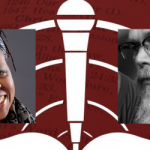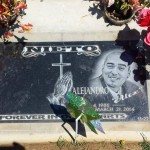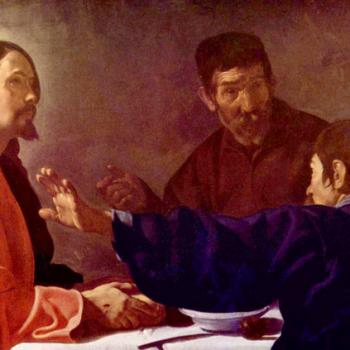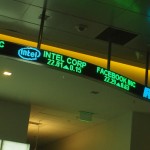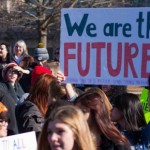There is one mystery, one paradox that runs through the Gospel stories. It’s the whole point of the story, and yet none of Jesus’ friends could ever quite wrap their minds around it.
Yes, they could all agree, Jesus was Messiah.
But no, Jesus kept insisting, not like that.
The juxtaposition was there for those with eyes to see during the entry into Jerusalem. While the crowds are shouting hosanna. They want the coming of the kingdom of David. They want the glorification of Jerusalem, so long promised.
But Jesus has chosen a humble mount: a claim to kingship, but a humble one.
Yes, the kingdom will come, but not like that.
Perhaps the first indication that things aren’t going to go quite as people hoped is Jesus’ anti-climactic arrival. After looking around, he decides it’s time to go to bed.
Cue the Monday morning return.
Signs of Life?
One of the most insidious lures of religious conviction is to number ourselves among the faithful and our deeds as the manifestation of that faithfulness. Our bustling activity becomes an indication that we are a vibrant people, committed to the cause of the Lord. 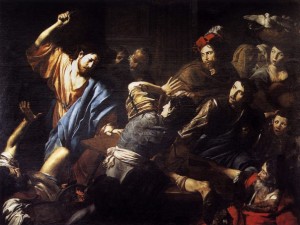
Look at our website and the signs of our flourishing are everywhere. You can see it from a mile off.
This is Jesus’s Jerusalem.
It is Jesus’s Jerusalem that is symbolized in the fig tree that Jesus approaches on Monday morning. It is in full green leaf, but fruitless.
Yes, it has life for itself. But no, it’s not life-giving for anyone else.
And so the surprise of Jesus’ messiahship begins to break through. Again.
His presence is not going to result in the glorification of a faithful people in a faithful city. His arrival is calculated to disclose the faithlessness of the city. It is calculated to confront them with himself as a Messiah who will not broker life-sucking systems of power.
Jesus curses the fig tree: never again will anyone eat fruit from you.
This is not an act of ecological destruction. It is a symbol of the people. It is a warning to us.
Is our flourishing truly the life-giving fruit that God has placed in the world for the greater world’s own good? Or have we created a system of frenetic activity that shows our own ability to sap nutrients from sun and soil without overflowing in life-giving fruit to the people in our cities and neighborhoods?
Temple Business
Jesus comes into the temple and cleans house. Well, that’s how we typically think of it. But this really is no purification ritual.
Jesus is enacting a word of prophetic judgment.
Anyone can see that Jesus is not happy with the goings on. He has not come to Jerusalem to be crowned king by those who superintend the heart of Israel’s religious observance. What, then, does his action mean?
He quotes Isaiah: Isn’t this house supposed to be a house of prayer for all people?
Yes. That is the future, eschatological destiny of God’s temple.
But that is not what Jesus sees. Jesus can’t come to Jerusalem as crowned and glorified king, now. The time isn’t right. The temple is not fulfilling its rightful function. Now is the time for judgment, not for glorification and honor.
What is this temple, if not the beacon to the nations?
“You have made it into a robber’s den.”
This is an allusion to Jeremiah 7. A prophetic sermon of condemnation. Israel had been using the temple as a good luck charm: people would engage in rampant injustice and robbery, and then think that they would be safe in the temple just because it bore God’s name. It was a place that robbers fled, hoping to be safe, after their exploits.
But God’s warned them: this temple will be destroyed.
That’s Jesus’ message. The turning over the tables is, itself, symbolic of a larger upheaval and overturning. This temple is not going to be blessed, it is going to be judged.
Like the fig tree, it is a place teeming with life. But it is not life-giving life. It is not the life that extends the bounty of earth and sun to the people in whose midst it’s placed.
The temple had become a consumer of resources. It had become a place dissociated from the justice and mercy God desired.
This would not be the temple of the messiah’s glory. This temple would be destroyed. (Jesus says so explicitly a couple chapters later.)
The Death of the Messiah
If Jesus was not going to come and affirm the power structures he found, there would be consequences. Anyone is willing to support the next king if they know there will be place for them in the new administration. (Just look at the cynical endorsements being handed out to Donald Trump.)
And those who hold the power already will almost always do whatever they can to ensure that it’s not taken away from them.
The scribes and high priests, the power brokers of this particular system of socio-political power (the temple) had seen enough. They wanted to destroy Jesus.
His actions indicted them. And they knew it. The crowds were amazed at his teaching, which did not depend on theirs. Or on their system of political and financial gain.
And so by Monday evening the die is cast.
Jesus who came in with shouts of acclamation has made it clear that he will not shout those acclamations back at the city in order to have it elevate him to royal power and glory.
He has a different way to his throne.
It is the way of the prophet. It is the way of truth. It is the way of trust—trust in God who can revive even a dead man and give him a throne of glory.
The coming kingdom of our ancestor David comes as did David’s own: through persecution and death. His actions in the temple seal that fate.

